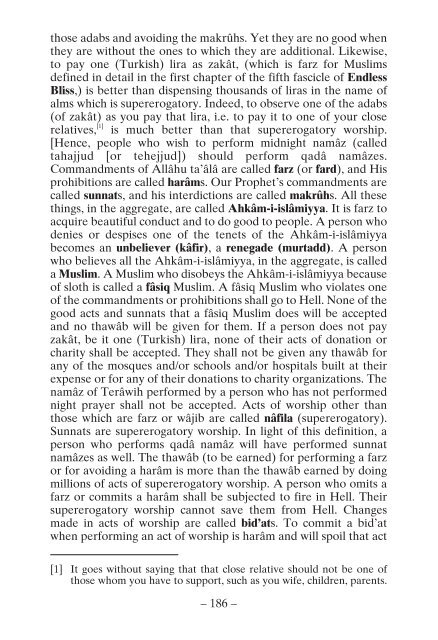Miftah-ul-Janna (Booklet for way to Paradise)
Create successful ePaper yourself
Turn your PDF publications into a flip-book with our unique Google optimized e-Paper software.
those adabs and avoiding the makrûhs. Yet they are no good when<br />
they are without the ones <strong>to</strong> which they are additional. Likewise,<br />
<strong>to</strong> pay one (Turkish) lira as zakât, (which is farz <strong>for</strong> Muslims<br />
defined in detail in the first chapter of the fifth fascicle of Endless<br />
Bliss,) is better than dispensing thousands of liras in the name of<br />
alms which is supereroga<strong>to</strong>ry. Indeed, <strong>to</strong> observe one of the adabs<br />
(of zakât) as you pay that lira, i.e. <strong>to</strong> pay it <strong>to</strong> one of your close<br />
relatives, [1]<br />
is much better than that supereroga<strong>to</strong>ry worship.<br />
[Hence, people who wish <strong>to</strong> per<strong>for</strong>m midnight namâz (called<br />
tahajjud [or tehejjud]) sho<strong>ul</strong>d per<strong>for</strong>m qadâ namâzes.<br />
Commandments of Allâhu ta’âlâ are called farz (or fard), and His<br />
prohibitions are called harâms. Our Prophet’s commandments are<br />
called sunnats, and his interdictions are called makrûhs. All these<br />
things, in the aggregate, are called Ahkâm-i-islâmiyya. It is farz <strong>to</strong><br />
acquire beautif<strong>ul</strong> conduct and <strong>to</strong> do good <strong>to</strong> people. A person who<br />
denies or despises one of the tenets of the Ahkâm-i-islâmiyya<br />
becomes an unbeliever (kâfir), a renegade (murtadd). A person<br />
who believes all the Ahkâm-i-islâmiyya, in the aggregate, is called<br />
a Muslim. A Muslim who disobeys the Ahkâm-i-islâmiyya because<br />
of sloth is called a fâsiq Muslim. A fâsiq Muslim who violates one<br />
of the commandments or prohibitions shall go <strong>to</strong> Hell. None of the<br />
good acts and sunnats that a fâsiq Muslim does will be accepted<br />
and no thawâb will be given <strong>for</strong> them. If a person does not pay<br />
zakât, be it one (Turkish) lira, none of their acts of donation or<br />
charity shall be accepted. They shall not be given any thawâb <strong>for</strong><br />
any of the mosques and/or schools and/or hospitals built at their<br />
expense or <strong>for</strong> any of their donations <strong>to</strong> charity organizations. The<br />
namâz of Terâwih per<strong>for</strong>med by a person who has not per<strong>for</strong>med<br />
night prayer shall not be accepted. Acts of worship other than<br />
those which are farz or wâjib are called nâfila (supereroga<strong>to</strong>ry).<br />
Sunnats are supereroga<strong>to</strong>ry worship. In light of this definition, a<br />
person who per<strong>for</strong>ms qadâ namâz will have per<strong>for</strong>med sunnat<br />
namâzes as well. The thawâb (<strong>to</strong> be earned) <strong>for</strong> per<strong>for</strong>ming a farz<br />
or <strong>for</strong> avoiding a harâm is more than the thawâb earned by doing<br />
millions of acts of supereroga<strong>to</strong>ry worship. A person who omits a<br />
farz or commits a harâm shall be subjected <strong>to</strong> fire in Hell. Their<br />
supereroga<strong>to</strong>ry worship cannot save them from Hell. Changes<br />
made in acts of worship are called bid’ats. To commit a bid’at<br />
when per<strong>for</strong>ming an act of worship is harâm and will spoil that act<br />
[1] It goes without saying that that close relative sho<strong>ul</strong>d not be one of<br />
those whom you have <strong>to</strong> support, such as you wife, children, parents.<br />
– 186 –

















